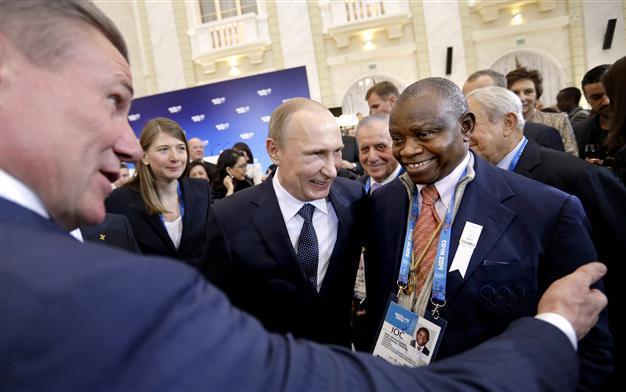Bubka confident for Lviv bid despite Ukraine turmoil
SOCHI - Agence France-Presse

Russian President Vladimir Putin (C) greets International Olympic Committee (IOC) members Habu Ahmed Gumel (R) and executive board member Sergei Bubka (L) at a welcoming event ahead of the upcoming 2014 Winter Olympics. REUTERS photo
Ukrainian pole vault legend Sergey Bubka on Feb. 9 said the protests rocking Ukraine would not harm its ambitious bid to host the 2022 Winter Olympic Games in the western city of Lviv.
Bubka, who is president of Ukraine's Olympic Association as well as an IOC executive board member, said holding the Winter Olympics in Ukraine would help unite his divided nation.
Ukraine's bid, which it formally filed with the IOC last year, foresees holding stadium events like ice hockey in the historic city of Lviv and the alpine and nordic events in the surrounding mountains close to the borders with Poland, Hungary and Slovakia.
But the government of President Viktor Yanukovych is battling a huge protest crisis which has seen pro-EU demonstrators occupy the centre of Kiev and seize government buildings in western cities including Lviv.
But Bubka - who has become a hugely respected sports administrator -- denied that the bid was an overly ambitious pipe dream.
"I am confident of a bright and good future for my country," said 1988 Seoul Olympics gold medallist Bubka, speaking in English and cannily steering clear of political controversy.
"I think it (the crisis) will be settled. We are building our future democracy," he told reporters at a news conference presenting the 2022 bid in 2014 Games host Sochi. Commenting on the protests he said: "People have a possibility to express their feelings." He said the Olympics were a great opportunity for Ukraine "to change the country, change the region and bring the country together." Bubka argued that despite the gravity of the crisis Ukraine had time on its side as the 2022 Winter Olympics were eight years away. "There is a huge difference with the timing. There is time to settle all the issues." "The politicians are working very hard to make changes to improve the situation in the country. I am confident all the issues will be settled shortly." He said that the Olympics would boost winter sports in Ukraine, which were never fully developed when it was a Soviet republic.
Stronghold of UkrainianThe choice of Lviv, a stronghold of Ukrainian language and culture is symbolic in a country that remains divided between the more nationalist west and the Russian-speaking east.
Officials emphasised that the Lviv bid had support from across the country and the project could rise above the current political turmoil.
Speaking alongside Bubka, Ukrainian Deputy Prime Minister Olexander Vilkul said that the idea of hosting the Olympic Games had support at "all levels" from both the government and the opposition.
"Olympic sports are higher than politics. Ukraine will decide its own political future and come out stronger and more consolidated," he said.
Vilkul said that Lviv and Ukraine had already shown their ability to host big events in the successful Euro 2012 football championship co-hosted with Poland.
Despite its current problems, the country is also gearing up to host the 2015 Eurobasket tournament.
Lviv is playing in its bid on the rich cultural heritage of the city, which over the last two centuries was part of the Austro-Hungarian Empire, independent interwar Poland, the USSR and part of independent Ukraine.
One of the novelties of the bid is the proposed construction of a bobsleigh and luge run in the centre of the city, taking advantage of its rugged topography.
Ukraine faces stiff competition from four other cities, all of whom are already canvassing support from IOC officials at Sochi.
The candidates are Beijing, Krakow, Oslo and fellow ex-Soviet hopeful Almaty, the biggest city in Kazakhstan.
